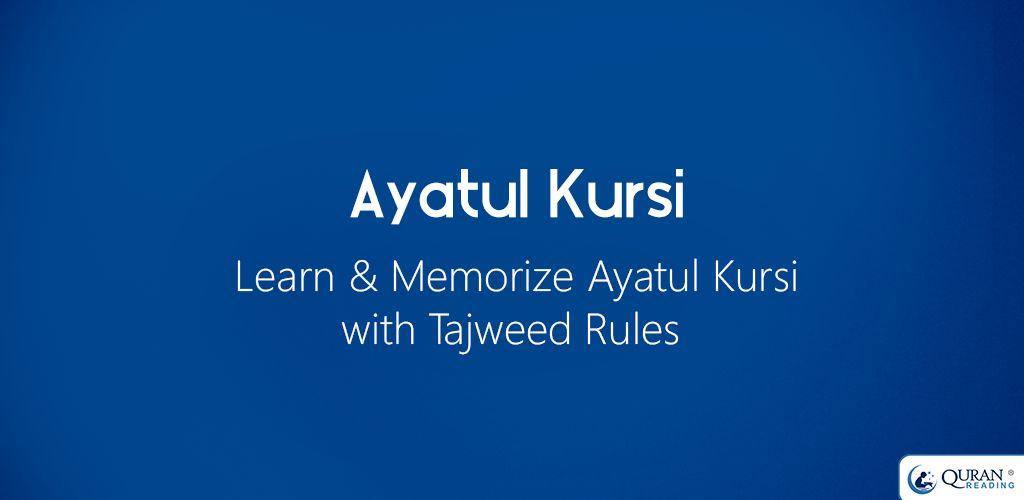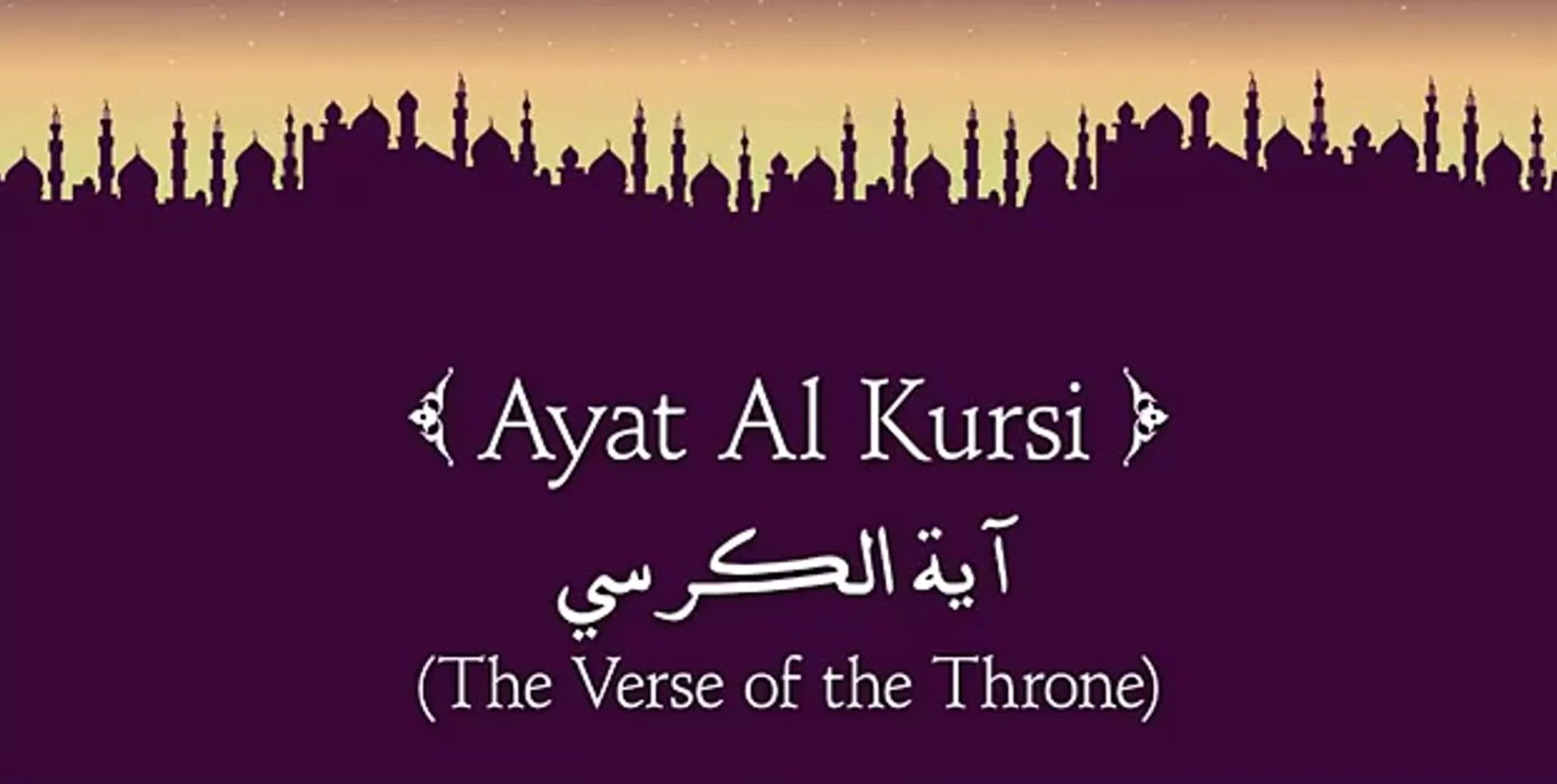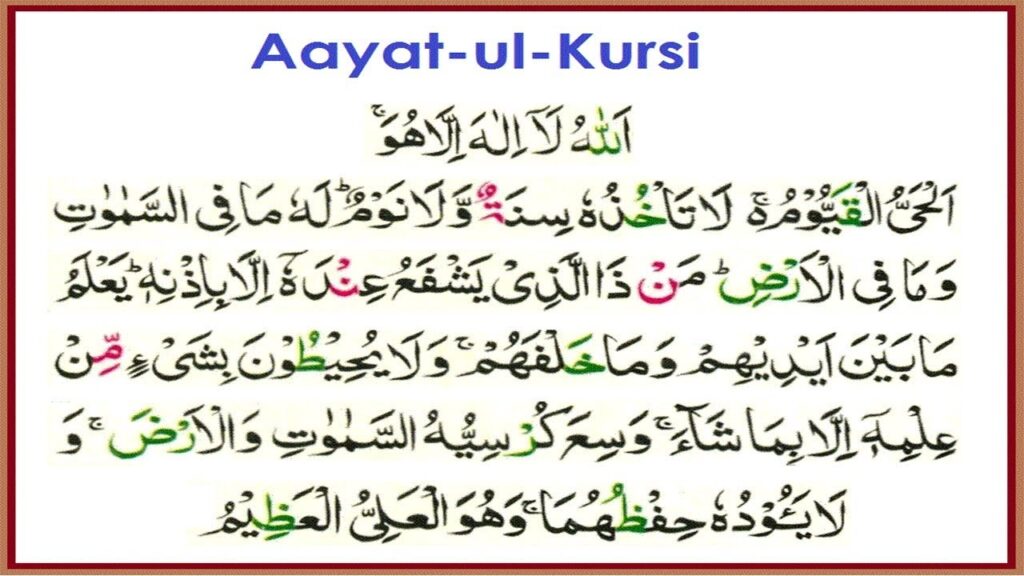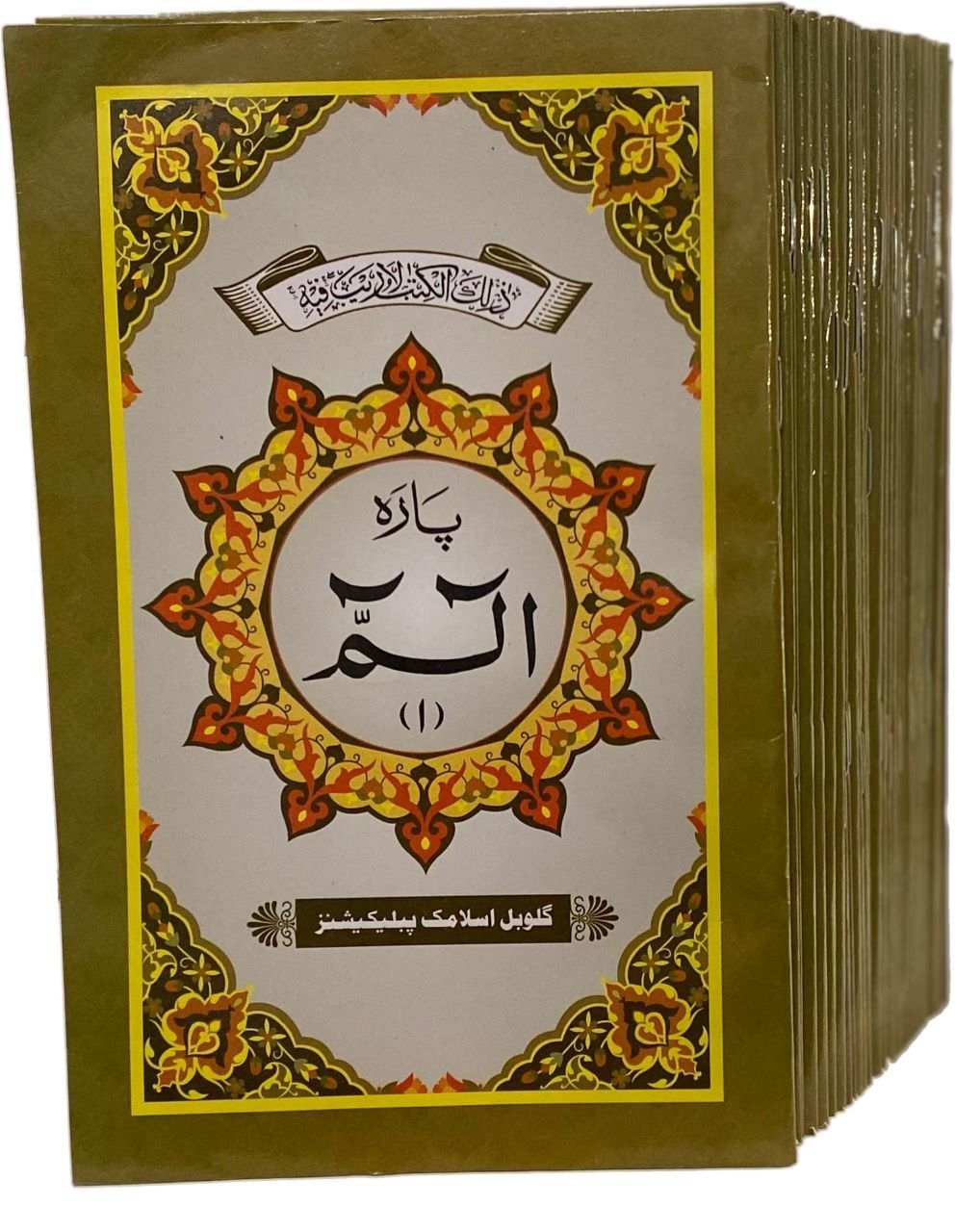
Unlock the power of Ayatul Kursi with our detailed Tajweed lessons, designed to help you master the beautiful and precise recitation of this powerful verse.
At Ahmad Quran Academy, we focus on the nuances of Tajweed, guiding you through each pronunciation rule to ensure accuracy and depth in every recitation.
Whether you’re new to Tajweed or seeking to refine your skills, our resources on Ayatul Kursi are tailored to enrich your understanding and connection with the Quran.
Ayatul Kursi, also known as “The Throne Verse,” is one of the most powerful verses in the Quran, found in Surah Al-Baqarah (2:255).
This verse emphasizes Allah’s sovereignty, knowledge, and power. Reciting Ayatul Kursi is a source of protection and blessings for Muslims. However, the beauty of this verse can be truly appreciated when recited correctly, following the rules of Tajweed.
This article explores the meaning, benefits, and Tajweed of Ayatul Kursi, along with its translations in English and Urdu.

What is Tajweed, and Why is it Important?
Tajweed, meaning “to make better” in Arabic, encompasses a set of rules that govern the pronunciation of Quranic verses.
The purpose of Tajweed is to maintain the linguistic and spiritual integrity of the Quran. When reciting Ayatul Kursi with Tajweed, the reciter pays attention to articulation, vowel elongations, pauses, and other phonetic rules, preserving the original intent and divine essence of the verse.
What is Ayatul Kursi?
Ayatul Kursi is a verse of profound significance in Islam. The word “Kursi” refers to the Throne of Allah, symbolizing His authority over the heavens and the earth.
The verse highlights Allah’s unparalleled knowledge and power. Numerous Hadiths emphasize the virtues of reciting Ayatul Kursi, including its role as a protector against evil and harm.
Arabic:
اللَّهُ لَا إِلَٰهَ إِلَّا هُوَ الْحَيُّ الْقَيُّومُ ١ لَا تَأْخُذُهُ سِنَةٌ وَلَا نَوْمٌ ۚ لَهُ مَا فِي السَّمَاوَاتِ وَمَا فِي الْأَرْضِ ۚ مَن ذَا الَّذِي يَشْفَعُ عِندَهُ إِلَّا بِإِذْنِهِ ۚ يَعْلَمُ مَا بَيْنَ أَيْدِيهِمْ وَمَا خَلْفَهُمْ ۖ وَلَا يُحِيطُونَ بِشَيْءٍ مِّنْ عِلْمِهِ إِلَّا بِمَا شَاءَ ۚ وَسِعَ كُرْسِيُّهُ السَّمَاوَاتِ وَالْأَرْضَ ۚ وَلَا يَئُودُهُ حِفْظُهُمَا ۚ وَهُوَ الْعَلِيُّ الْكَبِيرُ ٢
English Translation
Word-for-Word:
- Allah! There is no deity except Him, the Ever-Living, the Sustainer of existence.
- Neither drowsiness overtakes Him nor sleep.
- To Him belongs whatever is in the heavens and whatever is on the earth.
- Who is it that can intercede with Him except by His permission?
- He knows what is before them and what will be after them,
- and they encompass not a thing of His knowledge except for what He wills.
- His Kursi extends over the heavens and the earth,
- and their preservation tires Him not.
- And He is the Most High, the Most Great.
Complete Translation: “Allah! There is no deity except Him, the Ever-Living, the Sustainer of existence. Neither drowsiness overtakes Him nor sleep.
To Him belongs whatever is in the heavens and whatever is on the earth. Who is it that can intercede with Him except by His permission? He knows what is before them and what will be after them, and they encompass not a thing of His knowledge except for what He wills. His Kursi extends over the heavens and the earth, and their preservation tires Him not. And He is the Most High, the Most Great.”
Urdu Translation ayatul kursi
Word-for-Word:
- اللہ! اس کے سوا کوئی معبود نہیں، وہ ہمیشہ زندہ ہے، سب کچھ سنبھالنے والا ہے۔
- اسے نہ اونگھ آتی ہے اور نہ نیند۔
- جو کچھ آسمانوں میں ہے اور جو کچھ زمین میں ہے، سب اسی کا ہے۔
- کون ہے جو اس کی اجازت کے بغیر اس کی شفاعت کر سکے؟
- وہ جانتا ہے جو کچھ ان کے سامنے ہے اور جو کچھ ان کے پیچھے ہے،
- اور وہ اس کی علم کی کسی چیز کا احاطہ نہیں کرتے سوائے اس کے جو وہ چاہتا ہے۔
- اس کا کرسی آسمانوں اور زمین پر پھیلا ہوا ہے،
- اور ان کی حفاظت اسے تھکاتی نہیں۔
- اور وہ بلند و بالا، عظیم ہے۔
Complete Translation: “اللہ! اس کے سوا کوئی معبود نہیں، وہ ہمیشہ زندہ ہے، سب کچھ سنبھالنے والا ہے۔ اسے نہ اونگھ آتی ہے اور نہ نیند۔ جو کچھ آسمانوں میں ہے اور جو کچھ زمین میں ہے، سب اسی کا ہے۔ کون ہے جو اس کی اجازت کے بغیر اس کی شفاعت کر سکے؟ وہ جانتا ہے جو کچھ ان کے سامنے ہے اور جو کچھ ان کے پیچھے ہے، اور وہ اس کی علم کی کسی چیز کا احاطہ نہیں کرتے سوائے اس کے جو وہ چاہتا ہے۔ اس کا کرسی آسمانوں اور زمین پر پھیلا ہوا ہے، اور ان کی حفاظت اسے تھکاتی نہیں۔ اور وہ بلند و بالا، عظیم ہے۔”
Tafsir (Exegesis) of Ayatul Kursi
Ayatul Kursi is one of the most important verses in the Quran and has been extensively commented upon by scholars. Here are some key points from its tafsir:
- Affirmation of Tawhid (Oneness of Allah): The verse begins with a powerful declaration of Allah’s oneness. The phrase “لا إله إلا هو” (There is no deity except Him) emphasizes that Allah is the sole creator and sustainer of the universe.
- Attributes of Allah: The verse highlights two of Allah’s essential attributes:
- Al-Hayy (The Ever-Living): Allah’s existence is eternal, and He is not dependent on anyone or anything for His existence.
- Al-Qayyum (The Sustainer of Existence): Allah is the one who sustains everything in the universe, ensuring that all creatures continue to exist.
- Divine Knowledge: The verse underscores Allah’s omniscience. He knows everything that occurs in the heavens and the earth, as well as what is in the hearts and minds of His creatures. This divine knowledge encompasses all things, including the future and the past.
- Intercession: The verse mentions that no one can intercede with Allah except by His permission. This highlights Allah’s ultimate authority and control over intercession on the Day of Judgment.
- Kursi of Allah: The term “Kursi” is often translated as “Throne,” symbolizing Allah’s sovereignty over the universe. The verse indicates that Allah’s Kursi encompasses the heavens and the earth, signifying His absolute authority and majesty.
- Preservation without Fatigue: The verse concludes by stating that preserving the heavens and the earth does not tire Allah, emphasizing His power and ability. This serves to instill faith in the believers regarding Allah’s capabilities and might.
Step-by-Step Recitation Guide for Ayatul Kursi with Tajweed
Verse Text:
اللَّهُ لَا إِلَٰهَ إِلَّا هُوَ الْحَيُّ الْقَيُّومُ ۚ لَا تَأْخُذُهُ سِنَةٌ وَلَا نَوْمٌ ۚ لَهُ مَا فِي السَّمَاوَاتِ وَمَا فِي الْأَرْضِ ۗ مَنْ ذَا الَّذِي يَشْفَعُ عِنْدَهُ إِلَّا بِإِذْنِهِ ۚ يَعْلَمُ مَا بَيْنَ أَيْدِيهِمْ وَمَا خَلْفَهُمْ وَلَا يُحِيطُونَ بِشَيْءٍ مِنْ عِلْمِهِ إِلَّا بِمَا شَاءَ ۚ وَسِعَ كُرْسِيُّهُ السَّمَاوَاتِ وَالْأَرْضَ ۖ وَلَا يَئُودُهُ حِفْظُهُمَا ۚ وَهُوَ الْعَلِيُّ الْعَظِيمُ
Each word in this verse carries the weight of divine knowledge and protection. Reciting it with Tajweed ensures that each letter, sound, and elongation is respected, preserving the profound meaning of the words.
Detailed Analysis:
- الله – Emphasis on the ل (Laam) to maintain clarity.
- الْحَيُّ الْقَيُّومُ – Pronounce the Shaddah on يُّ and قَيُّومُ distinctly to respect the double-letter sound.
- لَا تَأْخُذُهُ – Careful pronunciation of Hamzah (ء) for precise articulation.
- مَا فِي السَّمَاوَاتِ – Emphasis on سَّمَاوَاتِ as per Tajweed rules on elongation.

Benefits of Reciting Ayatul Kursi with Tajweed
Practicing Tajweed with Ayatul Kursi enhances the spiritual benefits associated with the verse:
- Protection from harm: Reciting Ayatul Kursi serves as a shield against negative influences and danger.
- Connection with the Divine: Accurate recitation helps the reciter focus on the verse’s meanings, fostering a closer connection to Allah.
- Improved Focus: The effort involved in learning and applying Tajweed nurtures mindfulness and respect for the Quran.
Tips for Mastering Tajweed in Ayatul Kursi
- Practice Regularly: Repeated recitation with focus on articulation helps reinforce Tajweed rules.
- Use Audio Resources: Listening to expert Qaris (reciters) is invaluable. Studying their articulation enhances learning and provides a model to follow.
- Seek Guidance from a Teacher: Personalized instruction offers invaluable feedback, helping you master nuances in recitation.
Conclusion
Ayatul Kursi, with its powerful words and meanings, holds a special place in the hearts of Muslims worldwide. When recited with Tajweed, its beauty and depth are fully realized. Practicing Tajweed brings clarity to each word, preserves its divine message, and enriches the spiritual experience for the reciter. Embrace the discipline of Tajweed to unlock the true power and beauty of Ayatul Kursi.
 Colors
Colors 
 Support
Support 







